Youth innovation safeguards green heritage: 2025 World Food Forum Youth Action on Green Agri-Heritage held in Rome
Chinagate.cn, October 17, 2025 Adjust font size:
The 2025 World Food Forum Youth Action on Green Agri-Heritage was successfully held in Rome, Italy on Oct. 15. The event was co-hosted by the Office of Youth and Women of the Food and Agriculture Organization of the United Nations (FAO), FAO Laos, FAO Mongolia, the World Food Forum (China), and China Internet Information Center (CIIC), with support from Tsinghua University and the UNDP SDG Innovation Lab in Chengdu (SPARK Lab).

The 2025 World Food Forum Youth Action on Green Agri-Heritage is held on Oct. 15 in Rome, Italy. (Photo by Yang Xiaoxiao / China.org.cn)
Centered on the theme Youth Innovation Safeguards Green Heritage, the dialogue brought together over 50 youth representatives from more than 10 countries, agricultural experts, and officials from international organizations across the globe to explore innovative pathways for integrating agricultural heritage protection with youth-led initiatives.
Agricultural heritage systems promote the dialogue between humanity and nature, embodying ecological wisdom, cultural roots, and the future code of food security. However, one-third of the world's agricultural heritage systems are at risk of vanishing—mechanization erodes the intricate patterns of terraced fields, urbanization severs the breath of ancient tea gardens, and generational gaps turn traditional techniques into "museum specimens." In face of extreme climate challenges and an aging agricultural population, young people are revitalizing farming traditions through technological innovation and cultural storytelling, emerging as the driving force for living heritage preservation.

A group photo of youth representatives (Photo by Tang Xi / Tsinghua University)
Coinciding with the 80th anniversary of the United Nations and FAO, the 2025 World Food Forum, held at FAO headquarters in Rome, served as one of the year's most influential global high-level platforms on food and agriculture governance. Anchored in the concept of Agricultural Civilization, this event fostered innovative collaboration among youths from China, across Asia, and around the world, establishing a structured platform for mutual support and knowledge-sharing among heritage sites worldwide.
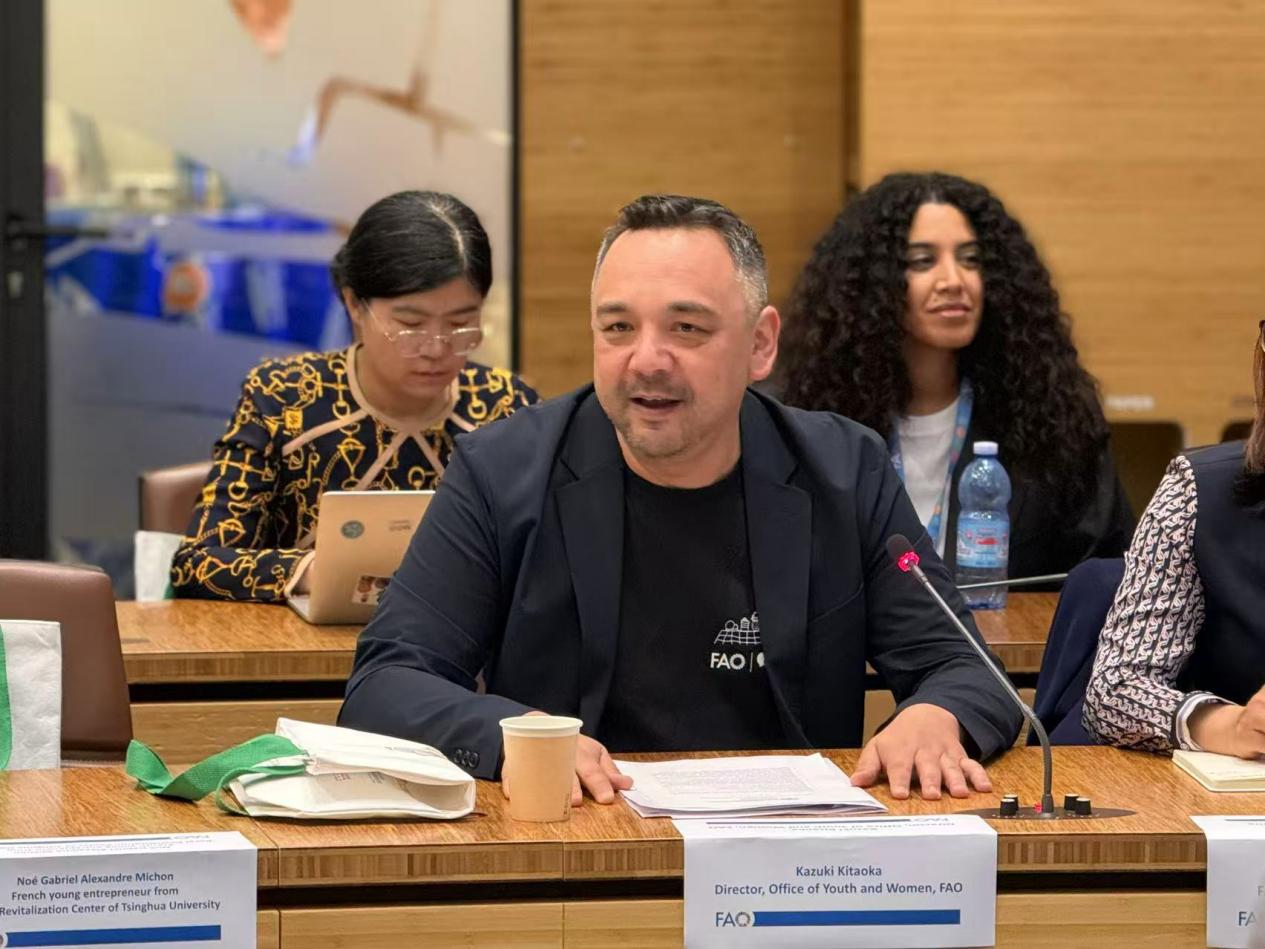
Kazuki Kitaoka, director, Office of Youth and Women of FAO, delivers welcome remarks at the 2025 World Food Forum Youth Action on Green Agri-Heritage. (Photo by Yang Xiaoxiao / China.org.cn)
In his welcome remarks, Kazuki Kitaoka, director, Office of Youth and Women of FAO, stated that today, for the first time, national chapter leaders from China, Laos and Mongolia and many other collaborators organized this youth side event, which provides a great opportunity to establish an effective demonstration mechanism towards a more inclusive, innovative and sustainable youth empowerment in the region and beyond.
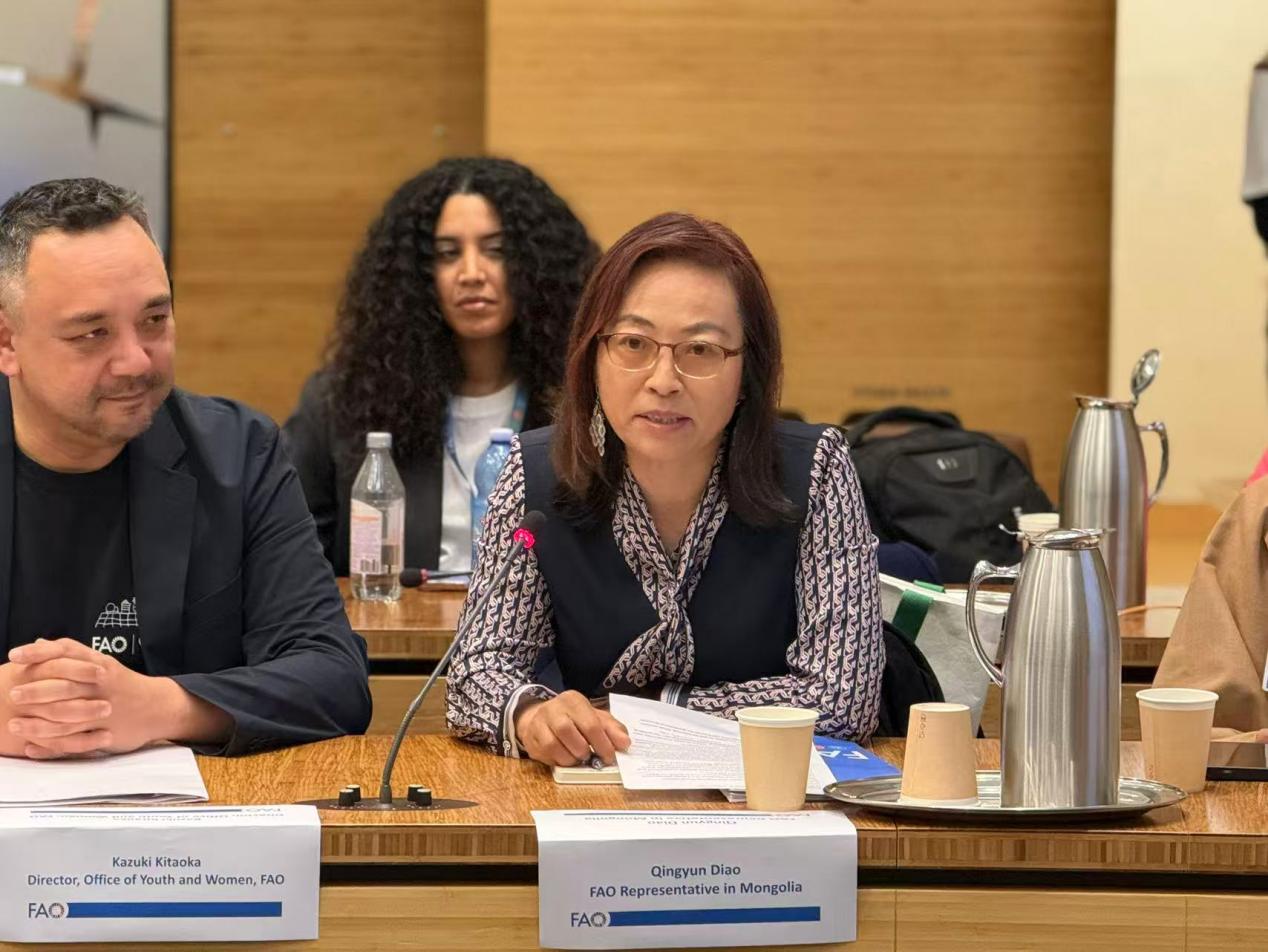
Dr. Qingyun Diao (right), FAO representative in Mongolia, delivers opening remarks at the 2025 World Food Forum Youth Action on Green Agri-Heritage. (Photo by Yang Xiaoxiao / China.org.cn)
"This year marks the 80th anniversary of the United Nations and the Food and Agriculture Organization, a moment to reflect on our shared journey and to celebrate how humanity's agricultural wisdom continues to nourish the world," stated Dr. Qingyun Diao, FAO representative in Mongolia. "Today's dialogue brings together young visionaries from China, Laos, Mongolia, and beyond, demonstrating how innovation and tradition can thrive together. Let us continue to empower young people not only as beneficiaries but as co-creators of the transformation towards sustainable, inclusive, and resilient agri-food systems."
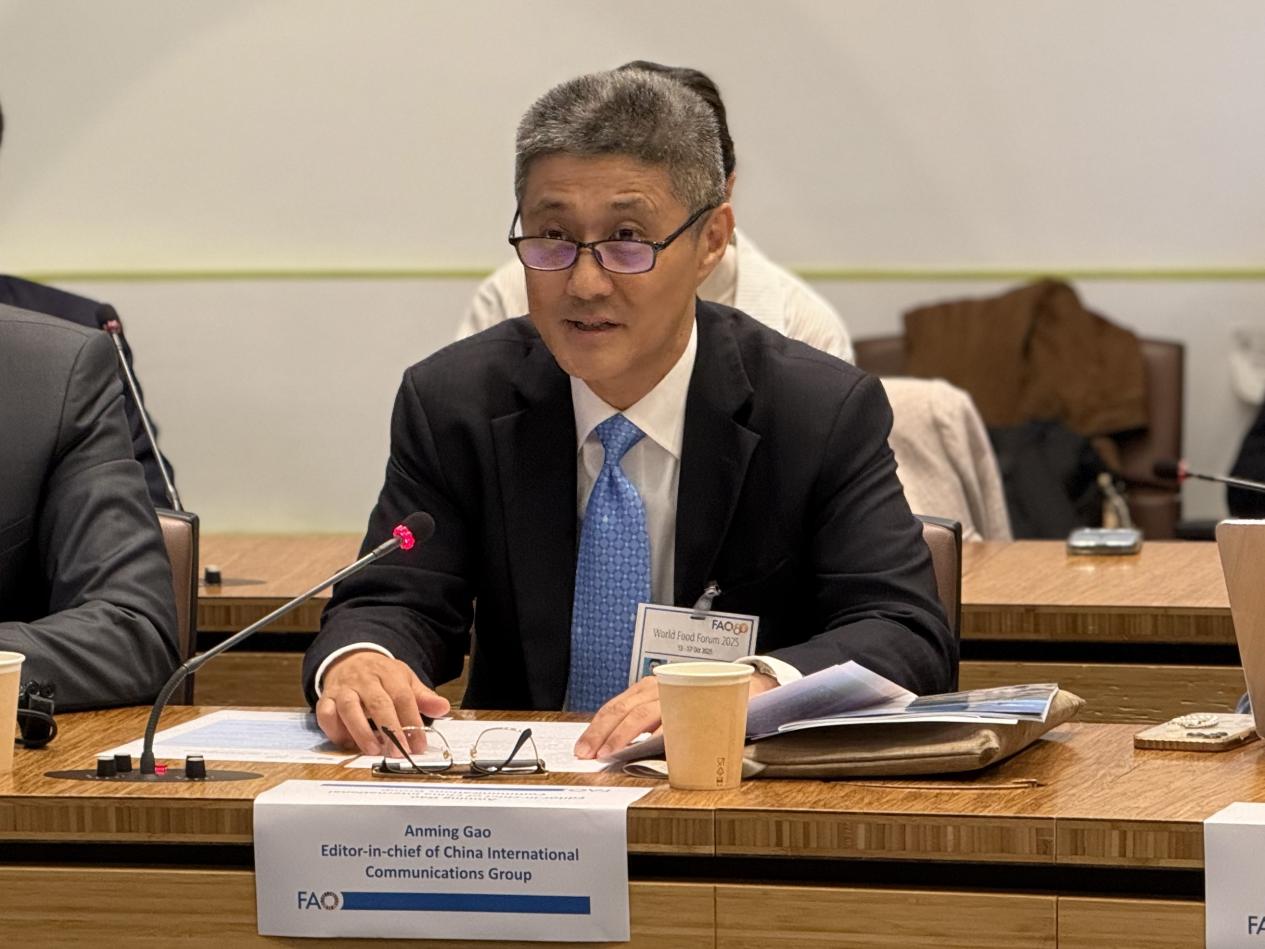
Gao Anming, editor-in-chief of China International Communications Group, delivers a speech at the 2025 World Food Forum Youth Action on Green Agri-Heritage. (Photo by Yang Xiaoxiao / China.org.cn)
Gao Anming, editor-in-chief of China International Communications Group, pointed out that "Agricultural heritage systems are more than just relics of the past—they are the crystallization of each nation's finest agricultural traditions and a testament to humanity's age-old wisdom in coexisting harmoniously with Mother Nature. He also introduced the fruits of Youth Action on Green Agri-Heritage initiative. Young participants from more than 10 countries developed 12 forward-thinking innovative proposals and produced six compelling short documentaries. Their efforts were later shared at events in Jeju Island, Republic of Korea, and Vientiane, Laos, with the participation of over 400 on-site participants. Through news coverage and social media, their stories reached a global audience of 200 million."
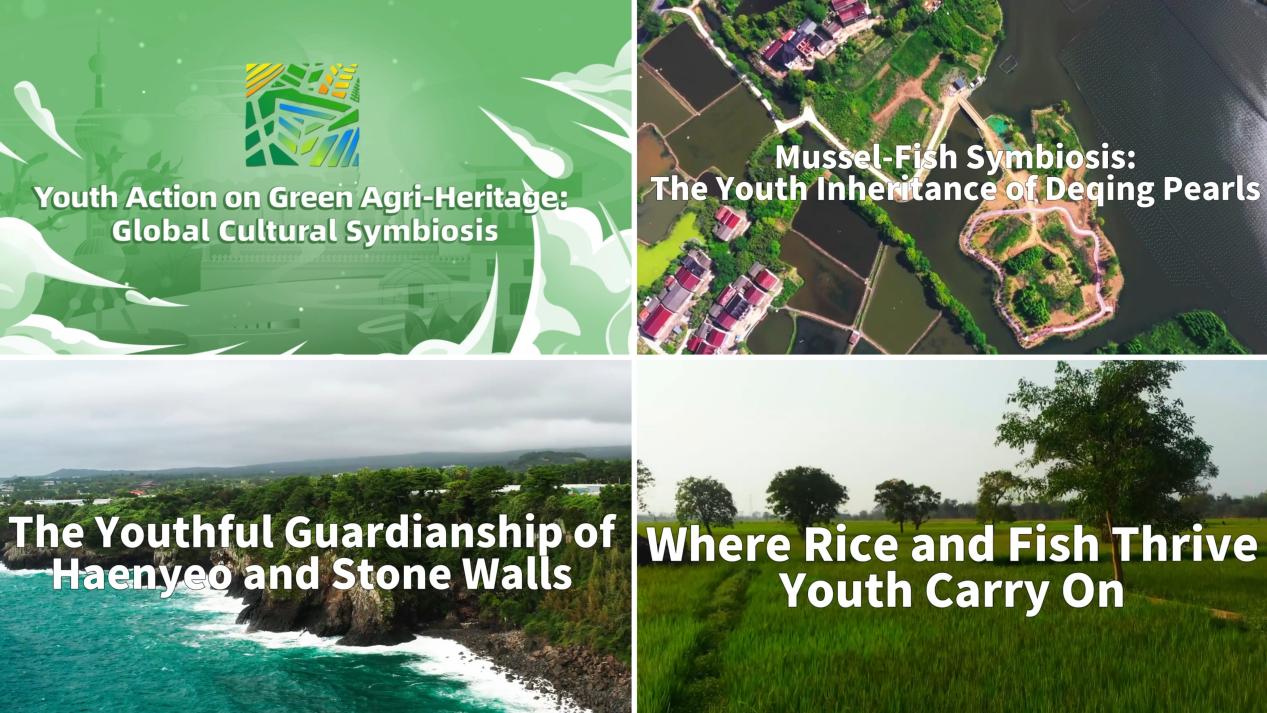
The video series "Youth Action on Green Agri-Heritage: Global Cultural Symbiosis" are premiered at the 2025 World Food Forum Youth Action on Green Agri-Heritage.
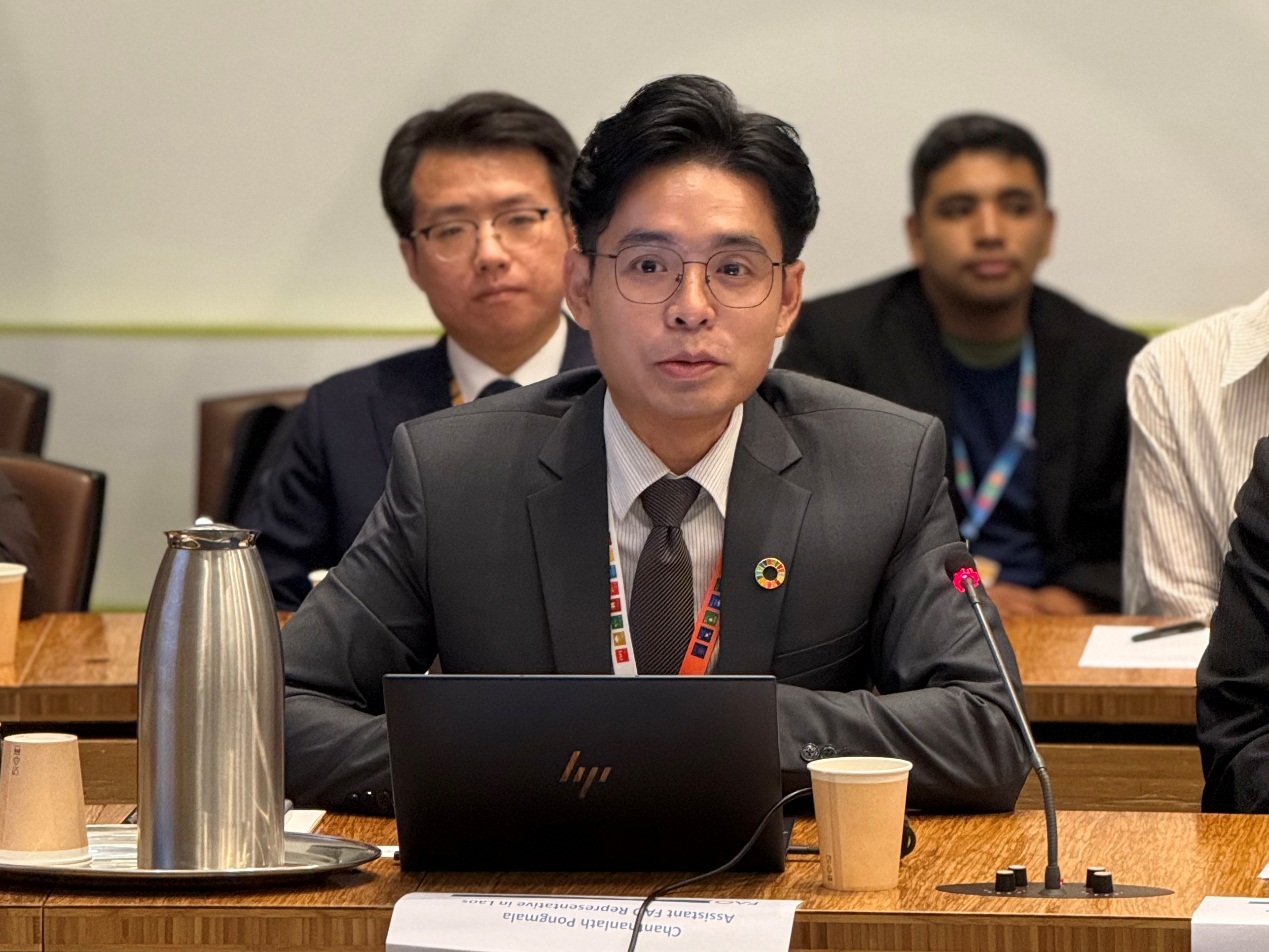
Chanthanlath Pongmala, assistant FAO representative in Laos, delivers a speech at the 2025 World Food Forum Youth Action on Green Agri-Heritage. (Photo by Yang Xiaoxiao / China.org.cn)
Chanthanlath Pongmala, assistant FAO representative in Laos, emphasized that collective response to climate change must be a transition to sustainable practices, bolstered by regional collaboration. Strengthening the protection of agricultural heritage is key to improving livelihoods for farmers, and the economic growth and food security could be promoted by developing agro-tourism, value-added products, and research into resilient crops. In addition, raising public awareness is essential to foster pride and inspire united action towards sustainable development goals.
During the presentation session, young practitioners from Laos, Mongolia, China, and France delivered inspiring presentations. Ekasith Vanmany shared national framework and youth engagement on agricultural heritage in Laos. Namjildorj B., a young Mongolian herder, shared his life on grassland in harmony with nature. Young representatives from China, Gu Shijing, Hou Yuying, and Liu Yuanrui presented innovative practices in ecological farming, rural entrepreneurship, and technology-driven heritage revitalization. The French young entrepreneur Noé Gabriel Alexandre Michon from the Rural Revitalization Center of Tsinghua University shared his entrepreneurial story of transforming plastic waste into recycled materials through technology, and collaborating with museums, enterprises and other institutions to process them into cultural and creative products, echoing the United Nations' sustainable development goals.
The subsequent International Youth Roundtable Dialogue, moderated by Ayesha Sabir, head of WFF Pakistan, brought together: Gong Jun, WFF Chengdu chapter lead; Sabin Lamichhane, head of WFF local action; Flora Igoe, head of WFF Culture, and youth representative from Laos and Mongolia. The dialogue explored youth-led solutions for a sustainable future of agricultural heritage systems, covering policy support, technological innovation, cultural communication, and community engagement, while fostering international collaboration to advance green heritage innovation.
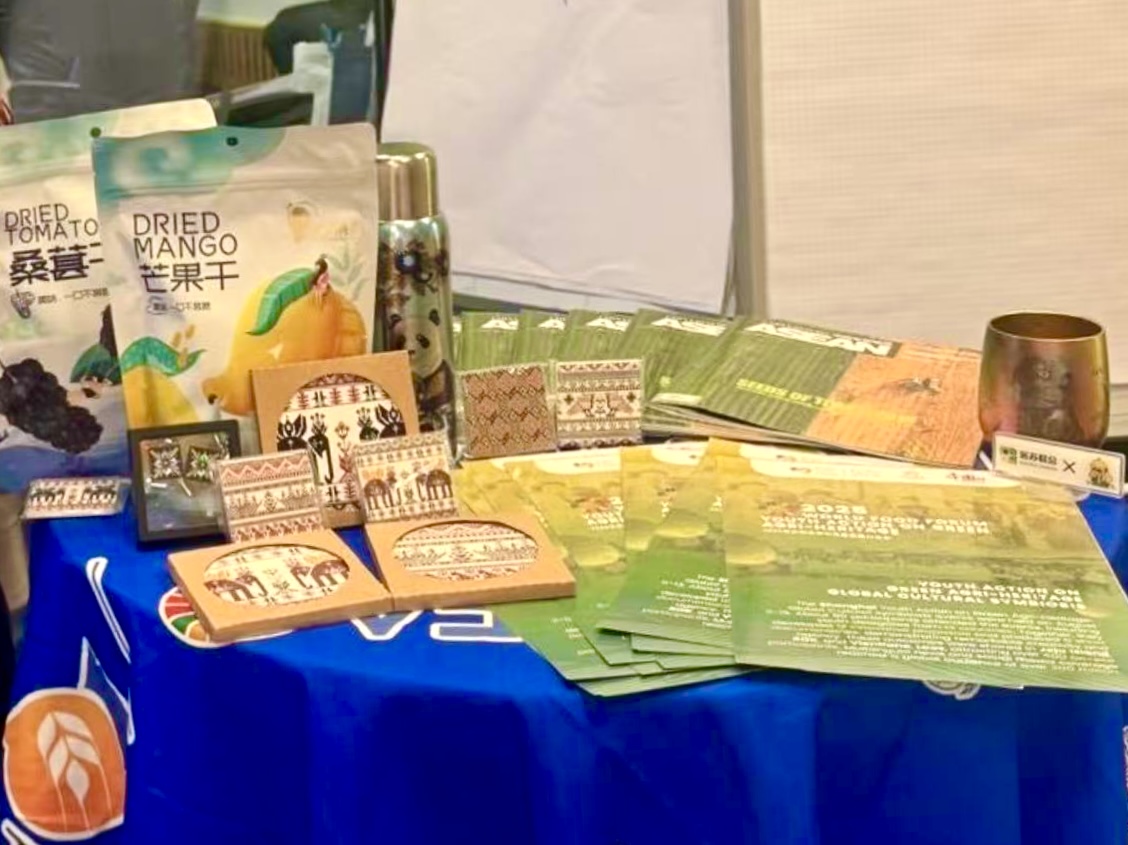
Agricultural specialty products from Yanbian county, Panzhihua city, Sichuan province, and the October issue of China Report ASEAN are displayed at the 2025 World Food Forum Youth Action on Green Agri-Heritage.
At the event, agricultural specialty products from Yanbian county in Panzhihua city, Sichuan province, as well as the October issue of China Report ASEAN, were on display. From individual innovation to ecological development, governments, universities, enterprises, and social organizations are working together to unfold a historic, systematic practice in the remote mountain county of Yanbian. Young people are integrating their innovations into traditional farming, developing popular mango and mulberry snacks, titanium products imbued with cultural charm, and handicrafts featuring ethnic elements.
China Report ASEAN is a magazine produced by the China International Communications Group (CICG). The 10th issue of "China Report ASEAN" features a cover story titled "Planting Tomorrow: Agricultural heritage from past to future." This issue is dedicated to outlining China's efforts and experience in preserving agricultural heritage, sharing five distinctive case studies, including Honghe Hani Rice Terraces, Fuding White Tea Culture System, and the Ar Horqin Grassland Nomadic System in Inner Mongolia, and exploring the potential for young people to contribute to conserving and innovating this heritage with modern technology.
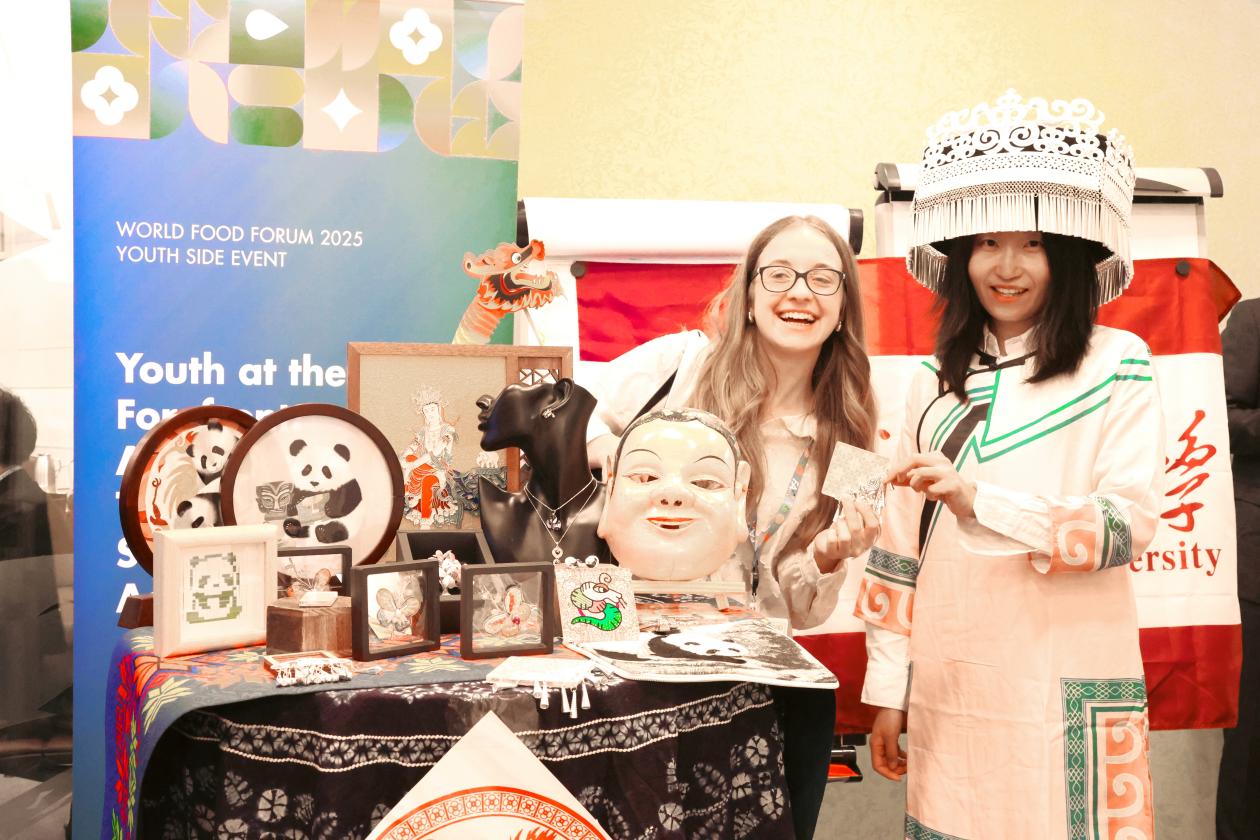
A view of the special exhibition area established by the Rural Revitalization Center of Tsinghua University outside the venue.
The Rural Revitalization Center of Tsinghua University established a special exhibition area outside the venue, which brought together innovative projects from rural areas in China, ranging from intangible cultural heritage products to the application of technology in environmental protection materials, showcasing the exploratory efforts of the younger generation in the fields of rural vitalization and heritage protection. During the event, representatives from various countries showed great interests in these projects originating from Chinese practice, experiencing firsthand vitality and vigor that innovation has brought to traditional agricultural culture.